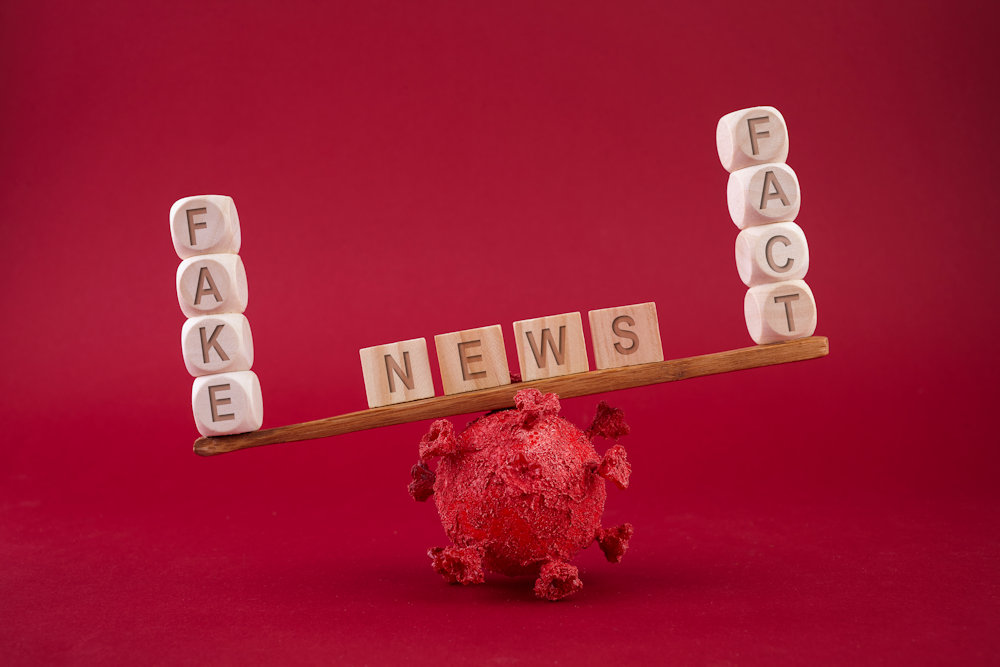Fighting an infodemic during a pandemic
By Anthea Mendes - Posted on 1 July 2020
The World Health Organisation has coined the term ‘infodemic’ to describe the unconstrained spread of misinformation on the coronavirus. Anthea Mendes takes a look at how the spread of misinformation on the virus is having an impact on the world around us.
As the Covid-19 pandemic continues to sweep across the world, it has been accompanied by an explosion of fake news (i.e. publishing intentionally or verifiably false news articles or statements that could mislead readers online). This explosion of fake news conflates around two notions: misinformation (i.e. information that is incorrect or false but not necessarily created to cause harm) and disinformation (i.e. created to cause harm to a person, social group, organisation or country).
Over past few months, we have been confined to isolation and working from home; our vulnerable members of society are shielding; parents at home continue to juggle several family and work responsibilities; and tensions about the future running high. These difficult times of social isolation, tensions and uncertainty seem like the perfect breeding ground for misinformation, especially at a time when reliable information is vital for public health.
With the online world being coloured with COVID-19 coverage, misinformation is spreading faster than the facts: from false theories connecting the 5G to coronavirus to the US President Donald Trump saying at a press conference that scientists should explore if injecting bleach can help cure the virus. We have been exposed to misinformation of fake remedies such as drinking lemon and bicarbonate or consuming saltwater and chloroquine or adulterated alcohol. While online digital platforms such as Twitter, Facebook, YouTube, and Instagram have helped in sharing information and news, they have also contributed to the spread of misinformation.
At the start of lockdown, people posted images of panic buying fuelled behaviours triggered by fear and anxiety such as stocking up on toilet roll and hand sanitizers. False information targeted at school and parent groups appeared on WhatsApp via forwarded messages, falsely appearing to be from a member of staff at a hospital in the UK -such fake news often utilises local names to make it seem more convincing.
Celebrities and influencers have also drawn criticism for the spread of misinformation on coronavirus and sharing 5G conspiracy theories. Internet users that have shared memes, photos or videos which make fun of the virus also risk spreading misinformation. Laughter and humour are great as coping mechanisms to temporarily ditch the discomfort in our heads, but satire and parodies can still contribute to the spread of misinformation. Unfortunately, there is a human cost to the spread of misinformation. The spread of some viral memes about the coronavirus has revolved around ethnic and racial jokes, which has resulted in racial slurs and people committing acts of hate and violence. The spread of fake remedies such as consuming adulterated alcohol as false medical advice resulted in several deaths in Iran. If people believe the fake medical advice, they are less likely to isolate and obey lockdown restrictions, thus potentially spreading the virus further and even contracting it.
So how are government officials and online digital platforms countering this infodemic?
The European Union announced in a joint effort to work with social media companies to remove any myths or fake news surrounding the coronavirus. In the UK, the government launched a Rapid Response Unit operating from within the cabinet office and No10 to remove misleading content and advice that will cost people’s lives. Facebook has developed a messenger coronavirus community hub with resources and tips to help users identify scams and misinformation thus preventing the spread of false news. The messaging platform, WhatsApp, with 1.6 billion active users announced that it has put new limits on forwarding messages to reduce the spread of misinformation. Other social giants such as Google and Twitter have also made attempts to limit the spread of misinformation on their platforms. When users of these platforms search for coronavirus information, their search is optimised to provide users with official links to the NHS website at the top of the search results. Twitter has also started to flag misleading information with labels and warnings, for example, flagging misleading tweets from US President Donald Trump. YouTube has been removing content that contradicts the guidance provided by the World Health Organisation. But we should not just leave it only up to social media companies to deal with it, we can help too.
So what can you do?
As first responders in the consumption of information during this infodemic, it is our responsibility to obtain and verify credible health-related information before we share it. This can include:
- Identifying trustworthy information sites for health-related information such as the National Health Service (NHS), World Health Organisation (WHO), Public Health Scotland, The Scottish Government or Gov.UK
- Be critical of the information you read and receive by looking at fact-checking websites (e.g. Full Fact). You can even follow them on Facebook and Twitter to stay updated with their regular fact-checking posts.
- If you live in a household with children and families, you can engage in some media literacy. You can discuss how to evaluate sources online via the BBC's Bitesize Fact or Fake? and ask questions such as:
- Does the website link make sense i.e. URL?
- Does it link to a reputable source?
- Is there an agreement on the meaning of the story from the different sources that you have read online?
- Reporting false or misleading information to platform administrators or moderators.
If it’s too good to be true, then it isn’t! The last thing we need during this pandemic is conspiracy theories and fake remedies going viral on digital platforms (pun intended). So, when in doubt, pause and review the information before you share anything online.
To find out more about our MSc Digital Marketing Management click here and to find out more about MSc Marketing click here










